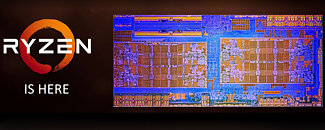- Joined
- Oct 9, 2007
- Messages
- 47,670 (7.43/day)
- Location
- Dublin, Ireland
| System Name | RBMK-1000 |
|---|---|
| Processor | AMD Ryzen 7 5700G |
| Motherboard | Gigabyte B550 AORUS Elite V2 |
| Cooling | DeepCool Gammax L240 V2 |
| Memory | 2x 16GB DDR4-3200 |
| Video Card(s) | Galax RTX 4070 Ti EX |
| Storage | Samsung 990 1TB |
| Display(s) | BenQ 1440p 60 Hz 27-inch |
| Case | Corsair Carbide 100R |
| Audio Device(s) | ASUS SupremeFX S1220A |
| Power Supply | Cooler Master MWE Gold 650W |
| Mouse | ASUS ROG Strix Impact |
| Keyboard | Gamdias Hermes E2 |
| Software | Windows 11 Pro |
Apparently, AMD processors officially compatible with Windows 11, exhibit a three-times increase in L3 cache latency with the new operating system. The new operating system is also found to break the "preferred cores" system on AMD processors (UEFI CPPC2), in which the two "best" CPU cores, which can sustain the highest boost frequencies, are highlighted to the operating system, so most of the light-threaded traffic could be sent to them.
AMD and Microsoft jointly made this discovery, and listed out potential impact on application performance. The increased L3 cache latency affects performance of applications sensitive to memory performance. They also warn of a 10-15% loss in gaming performance. On the other hand, a dysfunctional "preferred cores" system would mean reduced performance in light-threaded tasks as the OS is unaware which are the processor's two best cores. Thankfully, both issues can be fixed via software updates, and AMD is working with Microsoft to push fixes for both issues through Windows Update, in an update rollout scheduled within October 2021.

View at TechPowerUp Main Site
AMD and Microsoft jointly made this discovery, and listed out potential impact on application performance. The increased L3 cache latency affects performance of applications sensitive to memory performance. They also warn of a 10-15% loss in gaming performance. On the other hand, a dysfunctional "preferred cores" system would mean reduced performance in light-threaded tasks as the OS is unaware which are the processor's two best cores. Thankfully, both issues can be fixed via software updates, and AMD is working with Microsoft to push fixes for both issues through Windows Update, in an update rollout scheduled within October 2021.

View at TechPowerUp Main Site




